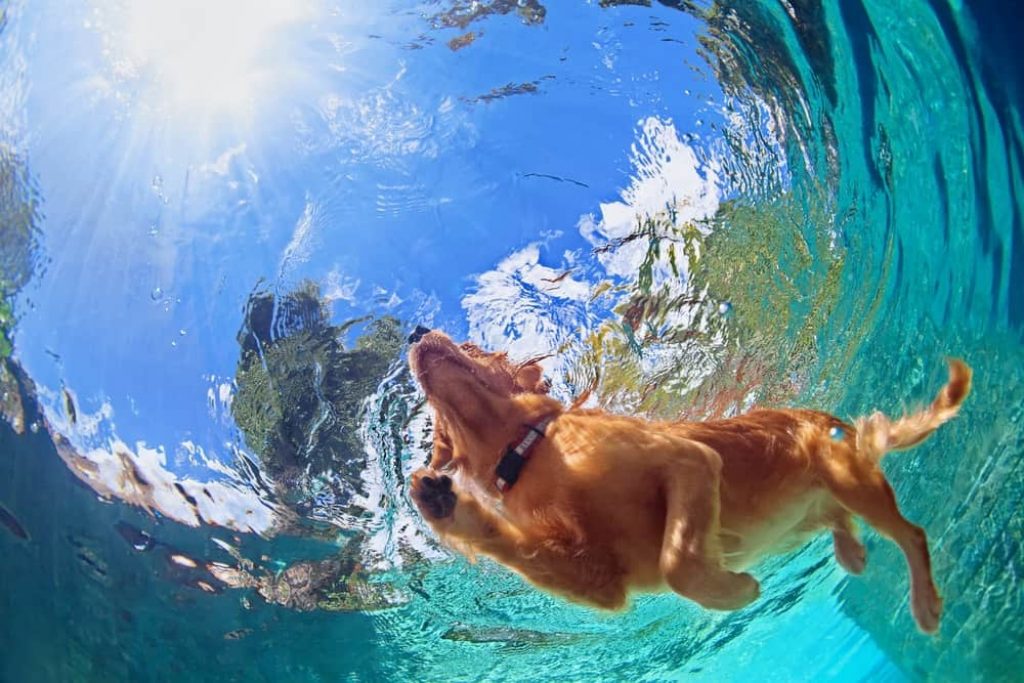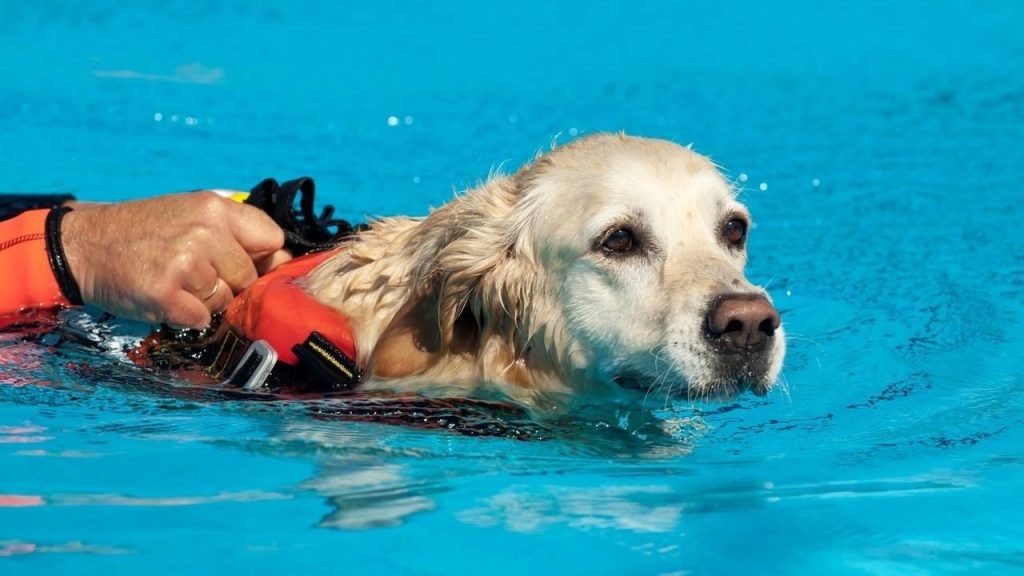


In many professional readings there is a clear statement: “Every dog can swim!”. This is not always the case. Especially when it comes to water-shy dogs or something negative is associated with the water. Often it is also more sensible to use precautions consciously. The reasons for this can be versatile. Especially on hot summer days, however, it is important that the four-legged friends have the opportunity to refresh themselves in the cool water on the way.
No ground under the paws – water habituation for the dog!

By nature, many dogs are able to swim. But there are also just as many who do not like it when suddenly the ground under the paws is missing. The distrust that dogs have of the water ensures that the four-legged friends paddle uncoordinated and helpless in the water. In order for the dog to enjoy swimming, it is important that he gets used to it step by step. With pleasure treats may be given to the confirmation to the success.
Young dogs learn swimming especially easily. Usually it is enough if an already experienced dog demonstrates it. With some animation, if necessary, the young dog will hardly be able to stop. However, it is important to know that there can be differences in puppies. They are due to the physique and muscle mass. Therefore, the puppies should not expect too much right at the beginning.
However, if the dog is water-shy or afraid of water, it is important to slowly familiarize the dog with water. It is extremely helpful if the dog owner himself keeps calm. This radiates positively on the mind of the dog. It is just as important not to force the dog to swim or to get into the water at all.
The first step can be dared in very shallow waters. If the dog owner takes relaxed a foot bath in it, the dog looks it off with the time. The quadruped learns to stand with the paws in the water. The first fright is taken. A toy can also be used as an incentive. If the dog is sure in this step, can be practiced further in somewhat deeper water. This is increased until the dog can swim freely without fear and panic. It must not be forgotten here in any way that if the four-legged friend has a negative experience, this will result in the fundamental avoidance of water and bodies of water.
Helpful accessories

There are also accessories that make it possible to teach the dog to swim. This includes, for example, the life jacket for the dog. The four-legged friend will notice that he stays afloat even without paddling. If the first attempts of paddling were successfully done, the life jacket can be taken off.
The dog life jacket also has the advantage that it allows the dog to swim even for him unknown waters. If unexpectedly high waves or currents occur there, the quadruped does not come into distress. Negative experiences are thus spared.
When choosing the right life jacket, make sure it fits properly. It is advisable to measure the dog beforehand and put on different models. The dog should enjoy sufficient freedom of movement in it. Depending on the purpose for which the vest will be used, bright colors should be chosen.
Another effective tool to make the water palatable to the dog is the dog pool or the dog paddling pool (also simply called dog swimming pool). If the first shyness is lost here, the next step can be taken into other waters.
Clear advantage of a dog pool is that long ways to the cool wet are saved. In addition, everything that dog and owner need for the bathing pleasure is within reach.
Who decides for a dog pool or a paddling pool, should take some criteria as a basis. This begins with the consideration of where this should find its place. Another point is that the dog has enough space to move without drowning.
With the material it is to be made certain that it is slip-proof. Gladly some dog owners tend to use bathing shells for children. In it, however, the dog does not find the necessary grip. Also favorable child pools are converted gladly to a dog pool. Here, however, it is good to know that the material will suffer from the claws of the four-legged friend. Therefore, if you want to enjoy the dog pool for a long time, you should pay attention to stable walls and floors.
By the way, the water for the dog pool should be free of additives. Even though chlorine and the like are known to make the water hygienic for longer, it damages the dog’s skin. It makes more sense to change the water at regular intervals.
FAQ
Can a dog swim?
In the professional guidebooks it says that every dog can swim. However, this is not entirely true. Because the animals can not always swim. The four-legged friend who stays away from the water can’t do very well at swimming either. But basically a dog can swim. It is usually not necessary to teach animals to swim, because the dog can prove its swimming talents even without the master’s intervention.
Which dogs like to go into the water?
It does not depend on the breed, but on the nature of the animal. Not every dog is the same, so in this case you can not make a blanket statement. There may well be dogs that are very fond of going into the water, while others avoid the cool water. So it does not depend on the breed of dog.
Should the dog be taught to swim?
If you want to accustom the animal to the water and try to give the dog the opportunity to swim, then you can resort to the life jackets. Especially young dogs must wear them, because it is not written on the forehead of the animal whether he can swim. Therefore, it is recommended to the dog owner to put a life jacket on the animal in the beginning. Dogs that cannot swim can be taught to swim with a life jacket and a trainer.
Conclusion
The dog will need his time until he dares to get into the water. Even if he does not reach the goal within a few weeks this is not a problem. The dog will remember the positive moments and will remember them in the following bathing season.







